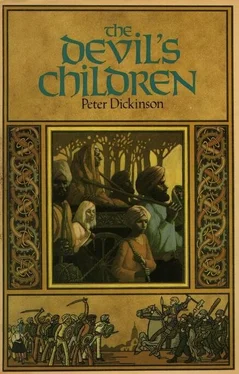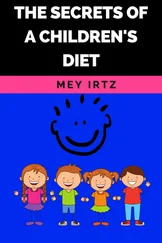Unknown - The Devils Children
Здесь есть возможность читать онлайн «Unknown - The Devils Children» весь текст электронной книги совершенно бесплатно (целиком полную версию без сокращений). В некоторых случаях можно слушать аудио, скачать через торрент в формате fb2 и присутствует краткое содержание. Год выпуска: 2013, Жанр: Старинная литература, und. Описание произведения, (предисловие) а так же отзывы посетителей доступны на портале библиотеки ЛибКат.
- Название:The Devils Children
- Автор:
- Жанр:
- Год:2013
- ISBN:нет данных
- Рейтинг книги:5 / 5. Голосов: 1
-
Избранное:Добавить в избранное
- Отзывы:
-
Ваша оценка:
- 100
- 1
- 2
- 3
- 4
- 5
The Devils Children: краткое содержание, описание и аннотация
Предлагаем к чтению аннотацию, описание, краткое содержание или предисловие (зависит от того, что написал сам автор книги «The Devils Children»). Если вы не нашли необходимую информацию о книге — напишите в комментариях, мы постараемся отыскать её.
The Devils Children — читать онлайн бесплатно полную книгу (весь текст) целиком
Ниже представлен текст книги, разбитый по страницам. Система сохранения места последней прочитанной страницы, позволяет с удобством читать онлайн бесплатно книгу «The Devils Children», без необходимости каждый раз заново искать на чём Вы остановились. Поставьте закладку, и сможете в любой момент перейти на страницу, на которой закончили чтение.
Интервал:
Закладка:
“Very English,” whispered Kewal in Nicky's ear. She trod on his foot, on purpose.
The army dispersed and the weapons were put away, though many of the villagers now copied the Sikhs and wore their swords wherever they went; the men relaxed and chatted while the women got supper ready and the village children taught the Sikh children how a maypole worked and the bigger boys played football. Nicky noticed an odd group around the old lady's cart, Mr. Maxie and Mr. Tom and Neena and Uncle Jagindar, all talking earnestly. Quite often one of them would glance across to where she sat against the pavilion wall fondling her stray dog’s ears.
It was a lucky night, warmer than usual for April, under a dull sky. Stars would have been pretty but would have meant frost, which no one wanted either for sitting out in or for the sake of the vegetable patches which were sown and showing. But even in that comparative mildness they were glad to sit within feel of the huge bonfires which had been built at the bottom of the recreation ground. The spit-roast mutton was very good, and the home-baked bread much nicer than chapati, Nicky decided.
After supper she didn’t feel like joining in anything, though there was dancing between the bonfires — whole lines or circles of dancers moving in patterns with a prancing motion which overcame the roughnesses of the turf, while Mr. Tom’s lionheaded fiddle sawed out the six-hundred-year-old tunes. Ajeet had attracted a ring of small children around her, a little beyond the circle, and was telling them a story which made some of them tumble about with laughter. Nicky sat and leaned her back against the wheel of the old lady’s cart and longed to be less stupid at Punjabi, so that she could talk to her without a translator. They were somehow the same kind of people, Nicky knew, herself and the old lady —- hard, practical, wild, loving. But though Ajeet or Gopal gave her a long lesson every day, so that she could now understand quite a bit of the talk, she couldn’t speak more than the easiest sentences back. She had never been any good at languages, not French, not German, and now not Punjabi.
So she leaned against the wheel and watched the pattern of dancers in the orange light of the bonfires, and the huge oval of faces, and the sudden fountain of curling sparks that erupted when a log collapsed. Neena came out of the dark and sat beside her.
“Are you happy, Nicky?”
“No, I don’t think so. I don’t know. I ought to be, but I’m not.”
“What do you want?”
“I don’t know that either.”
“We’ve been talking about you.”
“Yes, I noticed.”
“We think it’s time we tried to get you back to your own family.”
“Please don’t talk about it. Please!”
“No, listen, Nicky. Mr. Maxie’s cousin is a sailor at Dover. Mr. Maxie sent a message to him and he heard the answer yesterday. Ever since . . . since all these changes happened, boats have been going over to France, ferrying people away. Millions of people have gone. And the French have set up offices all along the coast, where they take everybody’s name very carefully. The French are good at that sort of thing. It may take a little while, but in the end they will find your parents for you, and all this will become just like a dream, or a story that Ajeet tells.”
“But why should anyone take me to France? What can I do in exchange?”
“We will pay them.”
“But no one’s got any money, not any more.”
“The smallest of my mother’s rings would buy a fishing boat ten times over. And she would give every jewel she owns to make you happy, Nicky. I sometimes think she loves you more than any of her own children or grandchildren. It is strange, is it not, how sometimes a soul will speak to a soul across language, across the generations, across every difference of race and birth and breeding.”
Neena spoke some sentences of Punjabi. Nicky knew enough to understand that she was translating what she had just said. Nicky put up her hand and felt the other hand take it, felt the hard, cold knuckles and the harder rings.
“Mr. Maxie’s cousin will come and fetch you next week,” said Neena. “He will see you safely right out to the middle of the Channel, where the big ships wait and the madness ends. Mrs. Sallow insists that she will go with you as far as the sea, so that you are not among strangers.”
“I don’t want to go,” said Nicky. “I daren’t.” “But why? You have dared and adventured much more terrible things. This should not frighten you.” “It’s not that kind of fright. It’s ... I don’t want to explain.”
Neena spoke quietly in Punjabi, and there was a short silence.
“Nick-ke,” said the old voice above her head. “Ai?” said Nicky.
The old lady began to speak, her voice dry and quiet, like the sound of a snake rustling across hot rocks in her own far country. This time it was she who spoke in short sentences, so that Neena could translate.
“Nicky, you are in danger. It is not the sort of danger we have fought through this last year. It is inside you. We have been in bad times. We have all had to be hard and fierce. But you have made yourself harder and fiercer than any of us, even than us Sikhs. In bad times you have to wear armor around your heart, but when times are better you must take it off. Or it becomes a prison for your soul. You grow to the shape of it, as a tortoise grows to the shape of its shell. Nicky, you must go to a place where you can take your armor off. That place is your parents’ hearth.”
Nicky felt a chill in her bones which was not the chill of the night air. The small smithy under her ribs started its hammering, and in her mind’s eye she saw the iron doll topple, grinning and jointless from his huge horse.
“How did you know about the armor?” she whispered.
Neena translated, and the old lady’s cackling laugh surprised the night. Then the snake-rustling sentences began again.
“I was married when I was twelve. To a man I had never seen. It was the custom of our people. I loved my parents and my brothers and sisters and our happy house, and then I was taken away from them. I too put armor around my heart. But I was luckier than you, Nicky, for my husband — oh, how old he seemed — was kind and patient and clever. He made a place, a world, in which I wanted to take my armor off.”
“Perhaps they’re dead,” said Nicky.
“Perhaps they are not. Perhaps you will not find them. Who can say? But until you have tried to find them you will make yourself stay hard and fierce. That is the danger of which I spoke. It is in your nature to become like that for ever.”
And that was true. Nicky knew that her kinship with the robber knight went deeper than the armor, deeper than the glorious wash of victory she had felt on the morning of the battle. Yes, she must go. But still she felt reluctant.
“Must I go so soon?” she said. “Next week is . . .”
“You must go now,” said Neena decisively. “We have not talked to the village about this, but we think that all this island is closing in on itself. Soon they will have forgotten about how to get people away; they will have forgotten about France. We must expect difficult times.”
“Then I ought to stay and help you,” said Nicky obstinately.
“No, We have learnt to be careful. We will survive and prosper. If you ever come back, you will probably find that Jagindar is an earl. Nicky, you don’t have to go. We all love you here, and we should like you to stay, out of our own selfishness. But we think you should try to go to your family.”
Nicky made up her mind, as usual, in one irrevocable rush.
“Yes,” she said. “Yes, I will go. But perhaps one of you could come with me as far as the sea. Kewal or Uncle Chacha or Mr. Surbans Singh.”
Читать дальшеИнтервал:
Закладка:
Похожие книги на «The Devils Children»
Представляем Вашему вниманию похожие книги на «The Devils Children» списком для выбора. Мы отобрали схожую по названию и смыслу литературу в надежде предоставить читателям больше вариантов отыскать новые, интересные, ещё непрочитанные произведения.
Обсуждение, отзывы о книге «The Devils Children» и просто собственные мнения читателей. Оставьте ваши комментарии, напишите, что Вы думаете о произведении, его смысле или главных героях. Укажите что конкретно понравилось, а что нет, и почему Вы так считаете.











